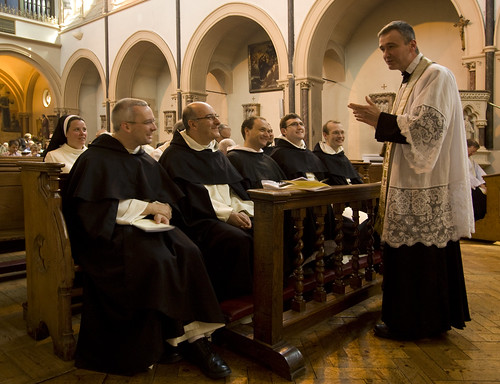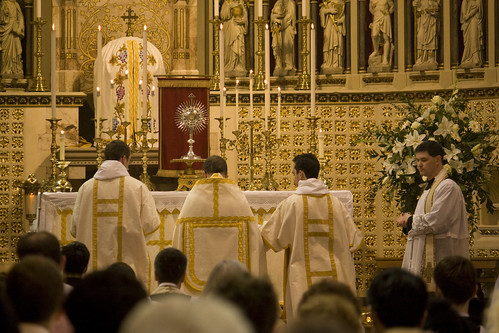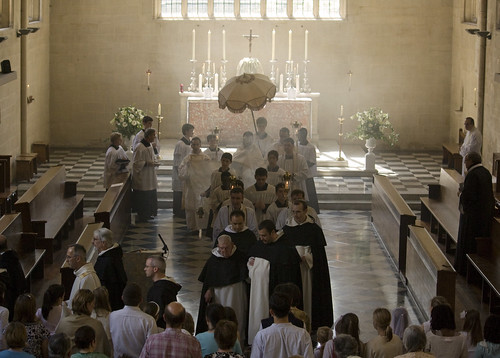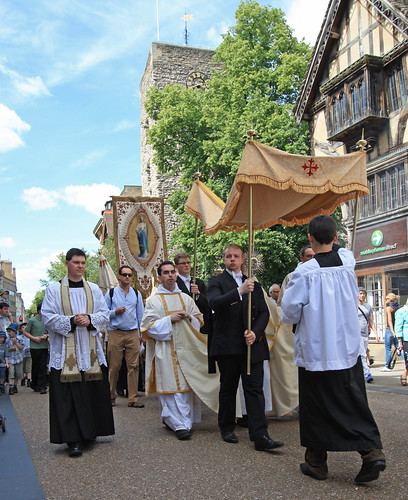_and_USS_Saratoga_(CV-60)_underway_crop-751596.jpg)
Tuesday, June 30, 2009
New Series - Cardinal Virtues and their Allies
_and_USS_Saratoga_(CV-60)_underway_crop-751596.jpg)
Monday, June 29, 2009
The Year of Paul, 29 June 2008-2009
 Godzdogz celebrated the Year of Saint Paul in a number of ways. There was a post to introduce the year and reflections for the feast of Saints Peter and Paul in 2008 and for the feast of the Conversion of Saint Paul in 2009.
Godzdogz celebrated the Year of Saint Paul in a number of ways. There was a post to introduce the year and reflections for the feast of Saints Peter and Paul in 2008 and for the feast of the Conversion of Saint Paul in 2009.Thursday, June 18, 2009
Corpus Christi Procession in Oxford

For the last ten years, the north Oxford deanery has held a Corpus Christi Procession that begins in the Oxford Oratory (St Aloysius) and makes its way through the centre of Oxford to the Oxford University Catholic Chaplaincy. En route, the procession stops in Blackfriars priory church, where the friars greet the Blessed Sacrament by singing the sequence 'Lauda Sion', written by St Thomas Aquinas. A sermon is then preached before the procession continues on its way.
This year's procession had a significant Dominican involvement. fr Richard Ounsworth OP preached the sermon, in which he likened the Eucharist to a mother breast-feeding, and thus giving her very life to her child. So it is when Mother Church gives us the Bread of Life. He also recalled Christ's Passion, which the Mass recalls, and said we should consider ourselves blessed, if, when we processed with the Lord through the city, we might even be mocked and so share in Christ's sufferings.
The procession walked past the Ashmolean Museum and down Cornmarket, one of Oxford's busiest shopping thoroughfares. On either side of the Blessed Sacrament were the deacon, fr David Rocks OP, and the acolyte, fr Robert Gay OP. The Blessed Sacrament was carried from the Oratory to Blackfriars by Fr Robert Byrne, Cong. Orat., Provost of the Oratory, and then from Blackfriars to the Chaplaincy by fr Benjamin Earl OP. fr Benjamin also gave Benediction at the close of the Procession which took place in the Chaplaincy's main hall.
Below are photos from the procession:

Fr Dominic Jacob, Cong. Orat., with some Dominicans who had gathered in the Oratory church for the start of the procession. Behind the friars is Sr Louise OP who made her final profession in March and who has recently joined the sisters' community in Oxford.

The Blessed Sacrament is exposed on the altar of St Aloysius' church

The priory church is packed for the Corpus Christi sermon

fr Richard Ounsworth OP preaching the sermon

fr Benjamin Earl OP incenses the Blessed Sacrament in Blackfriars priory church

The procession leaves the choir

The Procession goes past the Sackler Library on St John's Street

The canopy over the Blessed Sacrament is carried by four students of the University

The procession in Cornmarket, passing some of Oxford's oldest landmarks

fr Benjamin Earl OP, assisted by his Dominican brothers, incenses the Blessed Sacrament at its final station in the Chaplaincy

Fr Benjamin blesses the people with the Most Holy Eucharist

The procession ends in the Chaplaincy building with the singing of the 'Salve Regina'
Wednesday, June 17, 2009
Ministries, Charisms, Fruits - 22 Self-control

People can often be put off Christianity by a perception that it makes moral demands on its followers which it is impossible to live up to: “there’s no way I could manage that,” they might say, “so why bother trying?”
When St Paul teaches us in Galatians 5: 22 that self-control is one of the fruits of the Holy Spirit, he reminds us that things don’t quite work like that. You don’t have to be perfect before you even think about becoming a Christian: rather, it is the participation as a Christian in the life of God which enables you to grow in the way of perfection. Yes, the moral life is a struggle (but then that’s true even if you’re not a Christian – there are always things you know you ought to do even if you don’t particularly feel like it); however, it is by allowing God to work in us through the Holy Spirit, given at baptism that we acquire the strength we need to engage in that struggle. Now, that doesn’t mean that, the moment you’re baptised, you’ll immediately be perfectly self-controlled: after all, the Christian life is about a process of growth in the love of God and neighbour which lies at the heart of choosing to do the right thing. What it does mean, though, is that, in a sense, the person who said “there’s no way I could manage that” was right – we can’t make ourselves perfect through our own effort, we need the grace of God.
This is a useful reminder, too, for those of us who are already Christians, and who find ourselves from time to time, perhaps often, subject to all kinds of temptations and feel too weak to resist. If self-control is a gift of the Holy Spirit, then resisting temptation is not just a question of gritting our teeth and not giving in through sheer effort on our part: rather, we should seek to draw close to God in prayer, and especially in the Sacraments, in which he shares his life with us. In doing so, we allow the Holy Spirit we received at our baptism to work more fully in our lives, and thus our self-control grows as the fruit of his operation in us.
Monday, June 15, 2009
Ministries, Charisms, Fruits -21-Gentleness
 Nothing is so strong as gentleness, nothing so gentle as real strength - St. Francis de Sales
Nothing is so strong as gentleness, nothing so gentle as real strength - St. Francis de SalesGentleness is not often associated with strength. An alternative translation of praotes, the Greek word used by Paul, is meekness. Neither of these translations suggests strength. Far too often the opposite is assumed: to be gentle is to be delicate, weak and even feeble. The concept of gentleness does not seem to fit into the dog-eat-dog world we live in. However, gentleness, properly understood, is far from these negative connotations. To be gentle is to be in control of oneself. It is to have a balanced and tranquil spirit. It is to be even-tempered, and to have hold over the passions. The gentle person is the master of their strength and power. The Latin Vulgate expresses this by using the compound mansuetudo - being accustomed to taming the hand. Gentleness is being appropriately restrained in our actions and words, especially in our interactions with other people. We all recognize how hard it is to practise this virtue. Sartre said “hell is other people” and all too often we might feel that he is right. But because it is difficult we need the Holy Spirit to aid us in being gentle.
Saturday, June 13, 2009
Ministries, Charisms, Fruits - 20 Faithfulness
Thursday, June 11, 2009
Ministries, Charisms, Fruits - 19 Goodness
